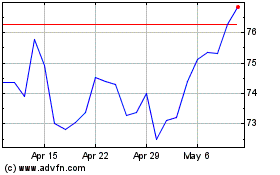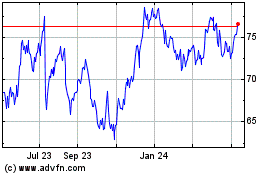State Street Global Advisors Sees Evolution in Strategy for Sovereign Asset Managers
February 01 2011 - 9:00AM
Business Wire
State Street Global Advisors (SSgA), the asset management
business of State Street Corporation (NYSE: STT), says that
challenges posed by turbulent financial markets over the past few
years have caused many of the world's leading sovereign funds to
reassess their investment strategies and risk management.
The findings, published in a new paper issued by State Street
Global Advisors entitled “Current Issues in Official Sector Asset
Management,” reveal that as a result, some of the funds are making
significant changes, including a growing shift from active
investment management strategies to passive ones and an increasing
focus on the emerging-market debt as yields on traditional asset
classes have fallen. Greater focus is being placed on the
possibility of accessing different and independent sources of
economic value such as land and infrastructure to help diversify
sovereign portfolios.
John Nugée, senior managing director of SSgA’s Official
Institutions Group, said: “Official sector asset managers - central
banks, governments and sovereign wealth funds – have not been
immune to the difficult market conditions. Many have re-examined
the performance of their funds, lessons they should draw from the
market turmoil and the extra defenses they need in their approach.
In many cases the review confirmed that their guiding principles
were correct, but a number have decided to make some important
changes.”
Changes in investment style
Given the extreme difficulties which many active fund managers
endured during the difficult market conditions, some sovereign
funds now feel using a more diversified set of market betas is
preferable, and they rely less on managers seeking alpha. In the
past 12 months SSgA has observed a significant shift of assets
within sovereign portfolios from active to passive strategies.
Commenting on this trend, one sovereign wealth fund in the
Middle East told SSgA: “In the past we used to assume that assets
should be managed actively unless a certain asset class or market
clearly did not offer opportunities for active managers or reward
active management. Now we tend to see this investment decision the
other way round. We conclude that assets should by default be
managed passively unless evidence is clear that a given asset class
has sufficient imperfections that active management is likely to be
consistently rewarded.”
In addition to this shift, sovereign portfolio managers have
also placed a growing focus on emerging-market debt, as they look
for alternatives to the low yields provided by the more traditional
asset classes. Not only does emerging-market debt offer attractive
returns, some sovereign funds also feel that they can be seen as a
long-term safe haven in uncertain times for the major reserve
currencies.
Risk management and the search for uncorrelated sources of
added value
State Street says that some of the more sophisticated sovereign
funds are looking to identify and access new sources of economic
added-value in order to provide better diversification for their
portfolios. A debate within the sector is growing around
diversification, with possible sources including land,
infrastructure and even art. However, a lot of work is still
required in order to refine this strategy into a quantifiable
theory that can be used to build diverse portfolios.
In addition to this diversification strategy, interest is
renewed within the sector in protecting their funds against extreme
losses with a possible role for ‘tail’ or ‘disaster’ insurance.
However, this type of cover is very expensive, and the insurance
industry providing the scale of cover sovereign funds want may
prove difficult. Sovereign funds are increasingly realising that
insurance against loss is not a viable option.
Finally, a number of sovereign funds are reviewing the various
instruments they use with a view to avoiding the more
reputationally damaging ones.
“When losses occur, questions are not only asked about the scale
of these, but also how they happened,” said Nugée. He continued,
“The last few years have shaken many previously firmly held
convictions and beliefs of sovereign asset holders about the
markets, investment theory and the correct way to manage asset
portfolios. However, despite this re-examination, they still look
well placed to continue to develop and prosper.”
This paper comes shortly after the announcement that State
Street Corporation (NYSE:STT), K&L Gates LLP and The Fletcher
School of Law and Diplomacy at Tufts University (The Fletcher
School), have developed a unique, collaborative relationship to
provide strategic insight, quantitative, independent research and
thought leadership focused on public policy issues and investment
challenges facing sovereign wealth funds (SWFs), institutional
investors, central banks, governments and international
organizations.
To obtain a copy of “Current Issues in Official Sector Asset
Management” paper please visit: www.ssga.com
About State Street Global Advisors
State Street Global Advisors (SSgA) is a global leader in asset
management. The firm is relied on by sophisticated investors
worldwide for its disciplined investment process, powerful global
investment platform and access to every major asset class,
capitalization range and style. SSgA is the asset management
business of State Street, one of the world’s leading providers of
financial services to institutional investors.
About State Street Corporation
State Street Corporation (NYSE: STT) is one of the world's
leading providers of financial services to institutional investors,
including investment management, investment research and trading
and investment servicing. With $21.5 trillion in assets under
custody and administration and $2 trillion in assets under
management at December 31, 2010, State Street operates in 26
countries and more than 100 geographic markets worldwide. For more
information, visit State Street’s website at
www.statestreet.com.
State Street (NYSE:STT)
Historical Stock Chart
From May 2024 to Jun 2024

State Street (NYSE:STT)
Historical Stock Chart
From Jun 2023 to Jun 2024
